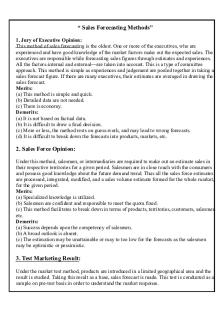394137612 Sales Report Legal Redemption PDF

| Title | 394137612 Sales Report Legal Redemption |
|---|---|
| Author | Mia Uy |
| Course | Financial Accounting |
| Institution | University of San Agustin |
| Pages | 6 |
| File Size | 127.7 KB |
| File Type | |
| Total Downloads | 2 |
| Total Views | 199 |
Summary
Lecture...
Description
SECTION 2. — Legal Redemption
ART. 1619. Legal redemption is the right to be subrogated, upon the same terms and conditions stipulated in the contract, in the place of one who acquires a thing by purchase or dation in payment, or by any other transaction whereby ownership is transmitted by onerous title.
Legal redemption is created by law. Under this Article, it can be exercised against a transferee who gets the property because of: (a) purchase, or (b) dation in payment, or (c) any other transaction whereby ownership is transmitted by onerous title. (Thus, not in case of a donation or succession.)
Definition of Terms
“thing” – the word “thing” is employed without qualification, the right applies to both movable and immovable property. Subrogation - transfers to the person (creditor) subrogated the rights pertaining to another. (Art. 1303.)
Note: o o o
Legal redemption may take place not only in purchase or dation in payment but in any other transfer of ownership by onerous title. It cannot take place in barter and in the transmission of property by hereditary title. not available where there is only a mortgage or lease.
Dation in payment or dacion en pago the transmission of the ownership of a thing by the debtor to the creditor as the accepted equivalent of the performance of an obligation. (Art. 1245.) -
The debtor offers another thing to the creditor who accepts it as equivalent of payment of an outstanding debt.
Basis and nature of right of legal redemption. Under the law (Rules of Court, Rule 39, Sec. 30.), the property sold subject to redemption may be redeemed by the judgment debtor or his successor-in-interest in the whole or any part of the property. In an extra-judicial foreclosure sale, the mortgagor, his successors-in-interest, judgment creditor or any person having a lien on the property subsequent to the mortgage, may redeem the same.
Examples of Legal Redemption Art. 1620: A co-owner of a thing may exercise the right of redemption in case the shares of all the other co-owners or of any of them, are sold to a third person. If the price of the alienation is grossly excessive, the redemptioner shall pay only a reasonable one. Should two or more co-owners desire to exercise the right of redemption, they may only do so
in proportion to the share they may respectively have in the thing owned in common.
Reason for the law: To minimize co-ownership. Right of legal redemption of co-owner. The right of legal redemption among co-owners presupposed of course, the existence of a coownership. The following are the requisites for the right to exist: (1) (2) (3) (4)
There must be co-ownership of a thing; There must be alienation of all or of any of the shares of the other co-owners; The sale must be to a third person or stranger, i.e., a non-co-owner; and The sale must be before partition.
EXAMPLES: (1) A, B, and C are co-owners of an undivided property valued at P500,000.00. A sells his interest to D for P200,000.00. B or C may exercise the right of redemption by reimbursing D the price of the sale. If both B and C redeem the interest sold by A, each of them shall pay P100,000.00 to D, which is the proportion of their respective shares in the co-ownership. If the price of P200,000.00 is grossly excessive, the same may be equitably reduced by the court. (2) The property inherited by A, B, and C, heirs, were mortgaged by X, decedent, during his lifetime, to D. The redemption of the whole property by C with his own personal funds does not vest in him sole ownership over said property but will inure to the benefit of all co-owners. In other words, it will not put an end to the lasting state of co-ownership. Redemption is not a mode of terminating a co-ownership. (Mardeno vs. Court of Appeals) ILLUSTRATIVE CASE: The sale was made by the father, a co-owner, to the wife of one of his children, the other co-owners. Facts: Spouses H and W owned a small lot. After W died intestate, H sold one-half of the lot to T, wife of S, H’s son. T refused to allow redemption by X, etc., other children of H and W. The lower court disallowed redemption because it considered T, the vendee, a co-heir, being married to S, and held the conveyance valid since it was in favor of the conjugal partnership of T and S in the absence of any statement that the property was paraphernal in character. Issue: Should X, etc. be allowed to exercise their right to redeem the property sold to T? Held: Yes. A co-ownership exists. Within the meaning of Article 1620, the term “third person” or “stranger” refers to all persons who are not heirs in succession, and by heirs are meant only those who are called either by will or the law to succeed the deceased and who actually succeeds. In short, a third person is anyone who is not a co-owner. (Villanueva vs. Florendo, 139 SCRA 329 [1985])
When right cannot be invoked. (1) Thing owned in common partitioned; (2) Shares of all co-owners sold; (3) Thing owned in common had been offered for sale by all co-owners;
Art. 1621: The owners of adjoining lands shall also have the right of redemption when a piece of rural land, the area of which does not exceed one hectare, is alienated, unless the grantee does not own any rural land. This right is not applicable to adjacent lands which are separated by brooks, drains, ravines, roads and other apparent servitudes for the benefit of other estates.
If two or more adjoining owners desire to exercise the right of redemption at the same time, the owner of
the adjoining land of smaller area shall be preferred and should both lands have the same area, the one who first requested the redemption.
Reason for the law: (a) To foster the development of agricultural areas by adjacent owners who may desire the increase for the improvement of their own land. (Del Pilar v. Catindig, 35 Phil. 263). (b) Reason for paragraph 2: Here the properties cannot be said to be adjacent. Proof of being nonadjacent is on grantee. (Maturan v. Gulles, L-6298, Mar. 30, 1964).
Requisites for the exercise of the right under this article: (1) Both the land of the one exercising the right of redemption and the land sought to be redeemed must be rural; (2) The lands must be adjacent; (3) There must be an alienation; (4) The piece of rural land alienated must not exceed one (1) hectare; (5) The grantee or vendee must already own any other rural land; and (6) The rural land sold must not be separated by brooks, drains, ravines, roads and other apparent servitudes from the adjoining lands. The lands mentioned in paragraph 2 of Article 1621 are not really adjacent. When the land exceeds one (1) hectare, the adjacent owners are not given the right of legal redemption because this may lead to the creation of big landed estates. The right cannot be exercised against a vendee if he is also an adjacent owner. The last paragraph of Article 1621 refers to a situation where the vendee of a piece of rural land is not an adjoining owner.
ILLUSTRATIVE CASES: Right of redemption by adjacent owner against vendee who is also an adjacent owner. Facts: S sold to B, an adjacent owner, a parcel of rural land. B bought the land for the purpose of having an egress from his land to a road. C, another adjacent owner, seeks to redeem the land sold to B. Issue: Has C the right to exercise the right of redemption granted to an adjacent owner? Held: No. The right of redemption of adjacent owners cannot be exercised by any of them among themselves, but only by them against a stranger, who acquires from any one of them by purchase or gift, in payment, or by any other title for value, a rural estate of the area fixed by law. (Del Pilar vs. Catindig, 35 Phil. 263 [1916].) Art. 1622: Whenever a piece of urban land which is so small and so situated that a major portion thereof cannot be used for any practical purpose within a reasonable time, having been bought merely for speculation, is about to be resold, the owner of any adjoining land has a right of pre-emption at a reasonable price. If the re-sale has been perfected, the owner of the adjoining land shall have a right of redemption, also at a reasonable price. When two or more owners of adjoining lands wish to exercise the right of pre-emption or redemption, the owner whose intended use of the land in question appears best justified shall be preferred. Rights of pre-emption and legal redemption of adjacent owners of urban lands. Article 1622 recognizes two rights; namely:
(a) Pre-emption, which has been defined as the act or right of purchasing before others. It is exercised before the sale or resale against the would-be vendor; and...
Similar Free PDFs

Shawshank Redemption Reflection
- 4 Pages

Sales Shadow Report - Grade: A
- 3 Pages

BNET Redemption NO CODE
- 1 Pages

Sales
- 4 Pages

Sales
- 2 Pages

Sales
- 14 Pages

Sales
- 40 Pages

Right of Redemption in India
- 16 Pages

Sales techniques
- 6 Pages
Popular Institutions
- Tinajero National High School - Annex
- Politeknik Caltex Riau
- Yokohama City University
- SGT University
- University of Al-Qadisiyah
- Divine Word College of Vigan
- Techniek College Rotterdam
- Universidade de Santiago
- Universiti Teknologi MARA Cawangan Johor Kampus Pasir Gudang
- Poltekkes Kemenkes Yogyakarta
- Baguio City National High School
- Colegio san marcos
- preparatoria uno
- Centro de Bachillerato Tecnológico Industrial y de Servicios No. 107
- Dalian Maritime University
- Quang Trung Secondary School
- Colegio Tecnológico en Informática
- Corporación Regional de Educación Superior
- Grupo CEDVA
- Dar Al Uloom University
- Centro de Estudios Preuniversitarios de la Universidad Nacional de Ingeniería
- 上智大学
- Aakash International School, Nuna Majara
- San Felipe Neri Catholic School
- Kang Chiao International School - New Taipei City
- Misamis Occidental National High School
- Institución Educativa Escuela Normal Juan Ladrilleros
- Kolehiyo ng Pantukan
- Batanes State College
- Instituto Continental
- Sekolah Menengah Kejuruan Kesehatan Kaltara (Tarakan)
- Colegio de La Inmaculada Concepcion - Cebu






